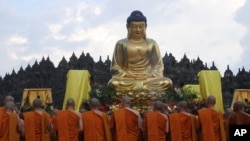Last week, Yangon’s V Gastro Bar displayed a flier on its Facebook page depicting Buddha in vibrant, neon colors, wearing large DJ headphones, next to the words "Buddha.bar." It promoted discounted drinks and electronic music.
Authorities in Myanmar, also known as Burma, took note. They arrested the bar’s general manager, New Zealand native Philip Blackwood, and his two Myanmar business partners, Tun Thurein and Htut Ko Ko Lwin. The men now face charges under a law that outlaws words or images that deliberately offend religion.
The three, who are being held without bail, face fines and a jail term of up to two years. Days after being detained, they have yet to find legal representation because of the case’s sensitivity. Blackwood is scheduled to appear in court Thursday.
Rights groups say the law in question, Section 295 of the penal code, is unjust. It was the second most frequently used law to charge political prisoners in the past, according to “Burma’s Forgotten Prisoners,” a 2009 report released by New York-based Human Rights Watch.
Phil Robertson, the rights group’s Asia director, said the law is so broadly and vaguely written that it can be easily abused by authorities or religious extremists, and the government should consider changing it.
"Unfortunately, the practice and defense of religion has gone to a more extreme stage in Burma, and what we can see is the willingness of the government to misuse provisions of law that are broadly drafted to take advantage of that,” Robertson said. “What we're also seeing is the effective criminalization of expression of views that go against some of the more extreme forms of Buddhism that are promulgated by the likes of the [anti-Muslim] 969 Movement and the mabatha."
The mabatha is a newly formed organization of monks, who refer to themselves collectively as the Organization to Protect Race and Religion and are becoming increasingly influential.
Robertson points out that the organization has used Section 295 to justify discriminatory practices against Muslims, whom they regard as a threat to Buddhism.
Hours after V Gastro Bar’s Buddha flier appeared on Facebook, the image had been shared several thousand times on social media. It since has been removed from the original page, replaced with an apology.
Perspectives differ
While international observers have been perplexed by the outrage on social media, Buddhism scholar Dr. Paul Fuller of Britain’s Bath Spa University said Asian Buddhists take a different approach to Buddha images than Buddhists in the west.
Although outside Asia it is not uncommon for Buddha images to be used as fashion accessories or garden ornaments, such displays could be considered blasphemous in Myanmar.
"I think we’re seeing it more and more because these fundamentalist Buddhist movements are fostering a sense of Buddhist identity tied in with national identity," Fuller said. "Buddhism has always had a very privileged place within the western romantic understanding. Maybe it’s time we see it for what it is – a religion with all its dark sides as well."
Several other prosecutions under Myanmar’s restrictive 295 law have garnered attention this year.
Earlier this month, opposition party National League for Democracy member Htin Lin Oo faced prosecution under Section 295 for giving a speech in which he condemned prejudice and racial discrimination in the name of Buddhism.
In an excerpt of the speech shared widely on social media, he is shown saying, "If you want to be an extreme nationalist, if you love to maintain your race so much, don't be Buddhist."
Earlier this year, Canadian tourist Jason Polley was deported from Myanmar when a monk in Upper Burma photographed tattoos of Buddha on his leg and shared the images on Facebook, sparking outrage. Polley was not formally charged with criminal offenses.




